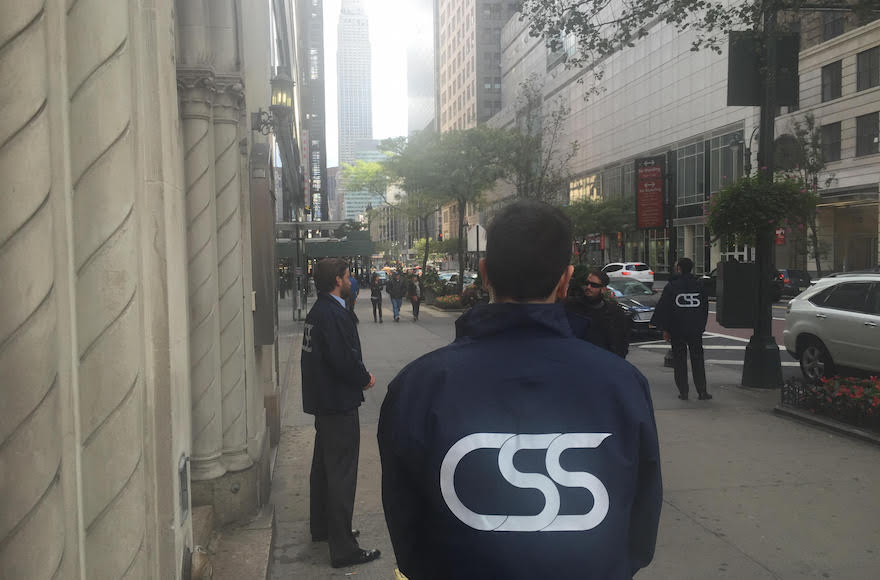NEW YORK (JTA) — On a typical Shabbat in Teaneck, New Jersey, streets are blocked off outside of major synagogues. Uniformed off-duty police officers, paid by the synagogues for the morning, stand near a cruiser parked nearby or direct traffic on the main street.
Volunteers, walkie-talkie earpieces disappearing beneath their lapels, stand at strategic points outside the synagogues keeping an eye on foot traffic. A few may have swept through the synagogue before services checking for suspicious objects.
The volunteers are among the over 4,000 volunteers in New York, New Jersey, Washington, D.C., Maryland, Pennsylvania and California who have been trained by Community Security Service, or CSS, to keep synagogues, day schools and other Jewish institutions across the country safe.
The group is trying to be the gold standard for synagogue self-defense — a goal that became even more relevant following Sunday’s massacre at a Texas church that left at least 26 people dead. Police say a 26-year-old man, Devin Patrick Kelley, opened fire with a military-style assault weapon before being shot himself by a neighbor and dying of his wounds.
“If the Jewish community is supposed to be an example for the rest of the world, then in the times we are living in, we should show other communities how to organize and how to help law enforcement help us,” Jason Friedman, Community Security Service’s executive director, told JTA on Monday.
CSS focuses on training community members to spot suspicious behavior and thus avert potential attacks.
“Our primary focus is to get volunteers from synagogues training in situational awareness and basic security theory, so this would mean how to conduct security at their synagogue, where to stand, what to look for, how to communicate,” Friedman said.
Volunteers take a basic course that lasts a few evenings. Then they can take additional courses in more advanced topics. CSS also provides basic training in self-defense.

CSS has trained over 4,000 volunteers across the country to protect Jewish organizations. (Courtesy of CSS)
CSS was founded in 2007 by David Dabscheck, now CEO of the consulting agency GIANT Innovation, and Adam Sager, an Israeli army veteran who now heads the security company Canary. They recruited Friedman, a U.S. Navy officer who has served in Afghanistan, as their first volunteer. Last year, Friedman became the first executive director of CSS, a nonprofit that runs on donations and foundation support.
Friedman says a “boots-on-the-ground” approach to security has been underutilized by Jewish organizations.
“I believe that the members of the Jewish community have not been engaged enough when it comes to Jewish security,” he said, “and without their participation, security initiatives are not sustainable.”
Friedman says Jewish organizations face multiple types of threats, including from far-right nationalists and neo-Nazis, radical Islamists and far-left anti-Israel activists. Some synagogues have reported shooting incidents, like the synagogue in Evansville, Indiana, that reported a bullet hole in a Hebrew school classroom window in March.
And then there are less spectacular threats, like unwelcome intruders or disruptive guests. Deena Seelenfreund, regional manager for CSS in New Jersey, said CSS-trained volunteers have helped prevent minor security incidents locally.
Events such as the shooting in Texas show the need for CSS volunteers, she said.
“People say we’re out in the middle of nowhere, we’re suburban, nothing is really going to happen, but we do this for the 1 percent chance that something is going to happen,” Seelenfreund said.
At Congregation Keter Torah, the Orthodox synagogue in Teaneck where Seelenfreund is a member, team members stand outside to serve as a deterrent against possible attack. Off-duty volunteers are also present inside the sanctuary.
“It’s the fine balance between being hospitable and greeting people and also being careful and discerning,” she said. And it is a positive experience not only for the 55 members who serve on the security team, but the congregation as a whole.
“The entire shul is more alert and [situationally] aware, and we will have non-security team members, just regular congregants, alerting the team to suspicious individuals or vehicles that they see on their way to shul,” Seelenfreund said.
At Ramath Orah, an Orthodox synagogue on Manhattan’s Upper West Side, some members initially were against CSS-style security measures.
“There were people who would push back and say ‘Why is there security out front? This isn’t Israel, this isn’t Europe,’” recalled Samuel Block, a co-manager of the synagogue’s security team. Synagogues in Europe often have armed security, including military personnel.
Block said security team members are there to ensure safety, not keep people out.
“We always tell our volunteers and the people that are coming, we’re not there as bouncers, we’re there to make sure that people are coming for the right reasons, and we ask people not to be offended if someone starts talking to you,” Block said.
Adam Hirsch, head of the security team at Congregation Bnai Yeshurun, another Orthodox synagogue in Teaneck, said volunteers there take a similar approach.
“We’re not checking membership cards, we’re not checking every person. We’re looking at people who look out of line, or don’t belong or are acting suspiciously,” Hirsch said.
Hirsch said his synagogue has benefited from receiving training by a larger organization.
“You’re not coming up with it out of the blue,” he said. “It’s actually following methodology that is consistent and is proven effective.”
JTA has documented Jewish history in real-time for over a century. Keep our journalism strong by joining us in supporting independent, award-winning reporting.






